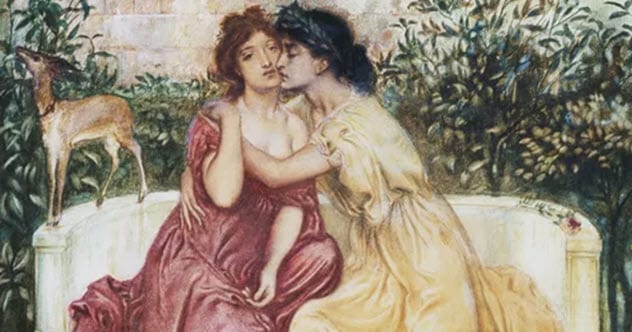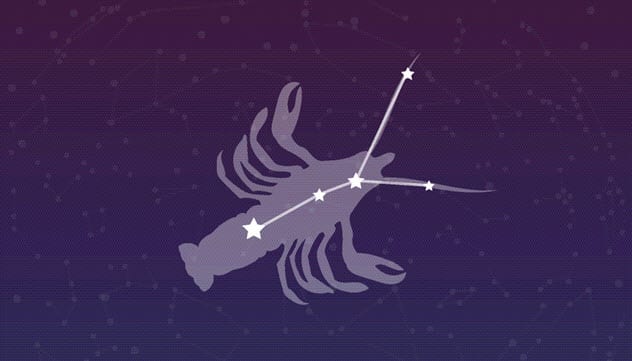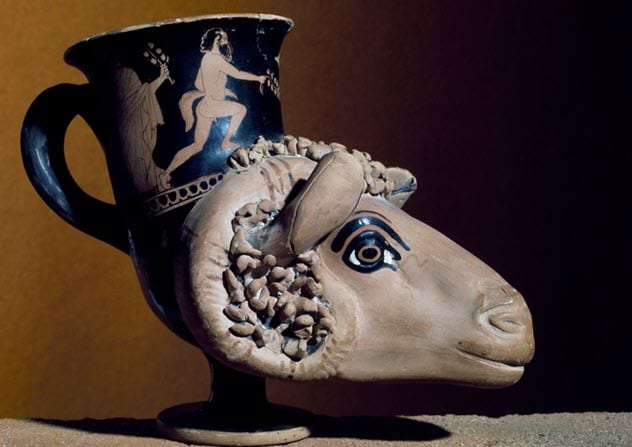 Mysteries
Mysteries  Mysteries
Mysteries  History
History 10 Surprising Stories About the Texas Rangers
 Humans
Humans 10 Philosophers Who Were Driven Mad by Their Own Theories
 Miscellaneous
Miscellaneous 10 Video-Game-Worthy Weapons and Armors from History
 Weird Stuff
Weird Stuff 10 Psychics Who Accurately Predicted Wartime Events
 The Arts
The Arts 10 Pieces of Art Inspired by a Broken Heart
 Health
Health 10 Science Fiction-Sounding New Medical Treatments
 History
History 10 Surprising Facts About the Father of Submarine Warfare
 Space
Space Ten Astonishing New Insights into Alien Worlds
 Weird Stuff
Weird Stuff 10 Bizarre Summer Solstice Rituals Still Practiced Today
 Mysteries
Mysteries Top 10 Haunting Facts About the Ghost Ship MV Alta
 History
History 10 Surprising Stories About the Texas Rangers
 Humans
Humans 10 Philosophers Who Were Driven Mad by Their Own Theories
Who's Behind Listverse?

Jamie Frater
Head Editor
Jamie founded Listverse due to an insatiable desire to share fascinating, obscure, and bizarre facts. He has been a guest speaker on numerous national radio and television stations and is a five time published author.
More About Us Miscellaneous
Miscellaneous 10 Video-Game-Worthy Weapons and Armors from History
 Weird Stuff
Weird Stuff 10 Psychics Who Accurately Predicted Wartime Events
 The Arts
The Arts 10 Pieces of Art Inspired by a Broken Heart
 Health
Health 10 Science Fiction-Sounding New Medical Treatments
 History
History 10 Surprising Facts About the Father of Submarine Warfare
 Space
Space Ten Astonishing New Insights into Alien Worlds
 Weird Stuff
Weird Stuff 10 Bizarre Summer Solstice Rituals Still Practiced Today
Top 10 Weird Histories Behind English Words
The English language is notoriously difficult to learn. First, it is full of strange idioms, like the sayings about not crying over spilt milk, looking a gift horse in the mouth, or having egg on your face. Second, it is shocking, stupefying, formidable, and distressing that we have so many synonyms.
Many of these difficulties arise from the fact that English is based on a combination of different languages. Sometimes, we can easily see the similarities between English words and the languages from which they are borrowed. Other times, this can be a little harder.
The following 10 English words have rather strange origins that may surprise you.
Top 10 Silliest English Words And Their Origins
10 Lesbian

The word “lesbian,” which is used to describe women who love other women, is derived from the Greek island of Lesbos. Around 600 BC, a poet named Sappho lived on this island. Most of her poetry has been lost to time, but we have collected fragments of her works from other writers who quoted her in their works.
Much of her writing was about women, and many of her poems are quite passionate about love. This has led to speculation that she may have been homosexual. By some accounts, she may have been married and had a daughter. But it is difficult to piece together the snippets that exist about Sappho.
Her daughter was named Cleis, but some scholars argue that this was really the name of Sappho’s lover. Her husband was said to be Kerkylas from the island of Andros.
However, the name “Kerkylas” is close to the word for “penis” and “Andros” is like the word for “man.” So the fact that her husband was named “Penis from the Island of Man” implies that this was probably a joke.[1]
9 Assassin

An “assassin” is a person who commits murder for money or a fanatical reason, such as political ideology. The history of this word stretches back to the Crusades. At that time, a sect called the Nizari Ismaili operated out of Lebanon. They were fanatical Muslims answering to a leader known as the “Old Man of the Mountains.”
This sect was responsible for murdering many leaders of opposing forces. It was believed by Western Europeans that the members of Nizari Ismaili did so after consuming large quantities of hashish, which would make them high. Although this is debatable, it earned them the nickname hashishin (“hashish user”).
By the time this word became part of the English language, it had already made its way through the Italian and French languages and mutated into the word “assassin.”[2]
8 Walrus

Before writing The Lord of the Rings, author J.R.R. Tolkien worked for the Oxford English Dictionary. As part of his duties, he had to uncover the histories of words beginning with the letter W, including “walrus.” Tolkien found varying histories behind this seemingly simple word.
He believed it to be most likely that “walrus” was derived from hrossvalir, an Old Norse word that translates to “horse-whale.” The whale part makes sense because walruses are also massive and have flippers. But the horse part is confusing. All we really know is that someone long ago probably looked at a massive mustachioed creature with giant tusks and thought the best comparison to a land animal was a horse.
Although Tolkien decided on the horse-whale etymology of “walrus” as the most reasonable, he labored over this decision for quite some time. Reportedly, he had more than six versions of this word’s history, some of which still exist in the Oxford English Dictionary archives.[3]
7 Quarantine

Undoubtedly, we have all encountered the word “quarantine” on television or in the newspaper. Some may have even experienced it firsthand since the onset of the coronavirus pandemic as this term has long been associated with disease outbreaks.
“Quarantine” is derived from the Italian word quarantino (“40-day period”). Back when the plague was spreading across Europe, Venetian policies dictated that incoming ships from affected countries could not enter the ports until 40 days had passed. This was meant to ensure that no cases of plague were brought into the country.
In a similar manner, people traveling during the coronavirus pandemic have been ordered to isolate for two weeks to prevent disease transmission. We should probably be thankful that we no longer use the 40-day period from the time of the plague.
However, you may be wondering how 40 days was chosen as the correct length of time to isolate someone. It is likely because 40 is an important religious number in Christianity. Medieval Christians believed that Jesus fasted for 40 days in the desert and that it rained for 40 days and 40 nights in the story of Noah’s Ark.
The idea that people needed 40 days to become purified fit well within existing religious beliefs of the time.[4]
6 Nimrod

“Nimrod” is often used as an insult for someone who is clumsy or foolish, but this word originally had a very different meaning. Nimrod is the name of the great-grandson of Noah in the Bible, and he was said to be a mighty hunter. This word only came to be associated with clumsiness and foolishness in the 1980s, and the reasons for this are debatable.
According to one theory, the alternative meaning of the word arises from its use in Bugs Bunny cartoons. Bugs was pursued relentlessly by inept hunter Elmer Fudd. That rascally rabbit sometimes referred to Fudd as a “Nimrod” to sarcastically compare his lack of hunting skills to those of the mighty Nimrod from the Bible.
However, due to the young audience misunderstanding the insult and the sarcasm, “nimrod” became a widely used term to describe someone who was klutzy or foolish.[5]
10 Offensive English Words With Hazy Origins
5 Muscle

When you look at a large, muscular person, the first image to pop into your head is unlikely to be a teeny-tiny mouse. Thus, it may surprise you to know that the word “muscle” is derived from the Latin word musculus (“little mouse”).
The reason for this odd connection between muscles and mice is all about appearances. Our ancient ancestors simply thought that a flexed bicep looked a lot like a tiny mouse was moving under a person’s skin.
The Middle English language had another word for someone muscular—lacertous. You may be happy to note that this word does not have anything to do with mice. Instead, it means lizard-like. Perhaps the lizards back in the day were quite jacked.[6]
4 Cancer

The connection between the astrology sign Cancer and the disease of the same name is based on crabs. The word “cancer” is derived from the Latin word meaning “crab.” The Cancer astrology sign is based on a constellation that is supposed to look like a crab, though it really looks more like an upside-down Y in the sky.
In Greek mythology, Heracles crushed a giant enemy crab under his foot during a battle with Hydra. Afterward, Hera rewarded the crab for its service by placing its remains in the sky among the stars. That became the Cancer constellation.
Returning to reality, a cancerous growth, usually surrounded by swollen veins and connections, was named after its similar appearance to a rounded crab body with legs extending from it. The likeness between crabs and cancerous tumors was noted by multiple prominent ancient Greek physicians, including Hippocrates.[7]
3 Malaria

Malaria is a disease spread by mosquitoes and characterized by recurring fevers, anemia, and jaundice. However, the history behind the name of this disease comes from a misunderstanding about its cause.
Before we knew that mosquitoes were responsible for infecting humans with malaria, there was something called the miasma theory. According to this theory, decaying materials gave off a toxic vapor that caused illnesses like malaria and cholera.
The word “malaria” is derived from the Italian mala aria (“bad air”). The vapors involved in miasma theory were often linked to marshes. A lot of decay was found in these wet regions, and people living near marshes often got sick.
The real cause? Mosquitoes like to lay their eggs near the standing water found in marshes.[8]
2 Tragedy

When you think of a tragic event, you probably do not automatically think about goats. Then again, maybe you do. The ancient Greeks certainly did, and this is why “tragedy” is derived from the Greek words tragos and oidos, meaning “goat song.”
Some confusion surrounds the exact origins of this word. But the connection to goats seems to arise from plays involving satyrs, nature spirits that combine human and goat or horse features. They were commonly seen in satyr plays. These plays often accompanied the performances of tragic plays, and they tended to be dramatic but funny.[9]
1 Candidate

Candidates running for political offices nowadays tend to be shrouded in scandal. Back in ancient Rome, they were shrouded in white togas instead. These garments were specially made to be very white, leading to the men who wore them being called candidati (“whitened men”).
This term originates from the Latin word candidus (“pure white”). Funnily enough, this word is also the basis for the English word Candida, which is a persistent type of fungus that can be difficult to eliminate.
This is likely because the fungus itself is white and can overgrow on the tongue, forming white patches called thrush. However, the connection between an annoying fungus and politicians is certainly interesting enough to be mentioned.[10]
Top 10 English Words Derived From Arabic








